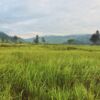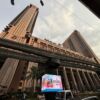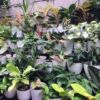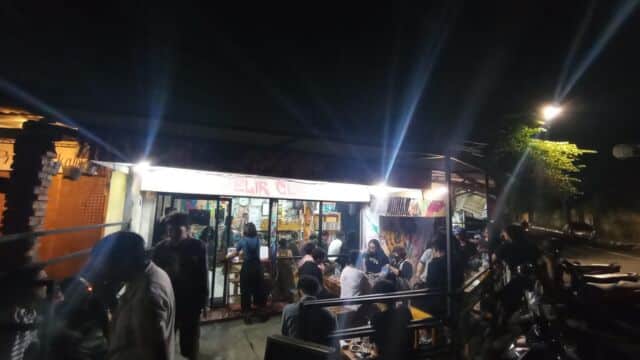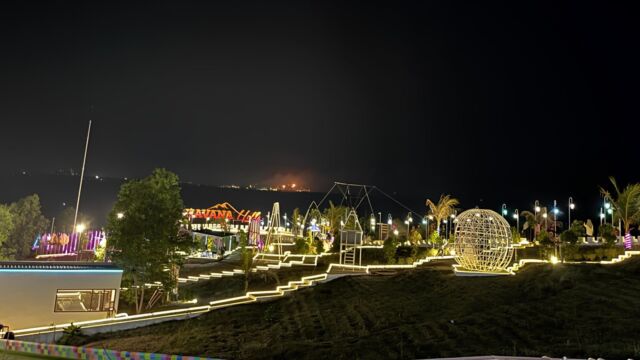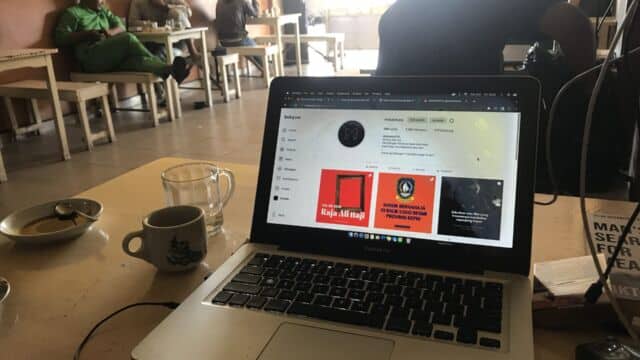In Maluku I Feared, Then Faced the Sea
Photo: Amy Djafar
Nukila Park, Ternate, Maluku | 2,000 words
Translated from Bahasa Indonesia by Lise Isles
Nobody wants to live with trauma, let alone for decades, and so it is with me. Especially because my trauma is wrapped up with a place that’s seen as enthralling, that’s a favorite place of many people: the sea and beach. In the past, never mind going swimming, just crossing the sea by boat or visiting the seaside made me take fright.
My fear grew out of an occasion when I almost drowned, back when I was wanting to learn to swim in the sea as a little kid. On that day, my friend Nova and I didn’t consider that ocean conditions might change even though they had until then been calm. When we were having fun practicing swimming, suddenly an underwater current pulled at us.
We reached out to try to grab each other’s hand, but there was too much distance between us. My head began to go underwater, while my legs couldn’t reach the sea-floor. I fought to kick my legs as strongly as I could, my eyes blinking open and closed because of the stinging of seawater. My hand groped for the surface, as I hoped there was someone who was watching and could soon help. I started to have problems taking in breaths; I swallowed sea-water. At that moment, I submitted my fate to the will of God. But then, the current that had tossed our bodies around in the water gradually receded, and my kicking in the water successfully brought me back towards the shallows, likewise for Nova.
When going home after this happened, we became aware that there was not a single person all along the beach. It was the middle of the day, so people were choosing to rest in their respective homes. There aren’t many houses in any case on Soagimalaha Beach, in North Maluku, an area where the electricity is on only for a few hours in the evening, and accompanied by the sound of frogs and cicadas. That realization made me voice without stop my gratitude that our fate had not been to die that day. But, afterwards, I no longer wanted to swim.
From that incident, I grew up with a fear of the sea, even though my house in Ternate – Ternate being a small island within an archipelagic region – is not far from the sea. Shadows of the time I almost drowned played across my mind always, especially when I had to visit family beyond Ternate, something that can really only be done by sea transport between the closely-adjacent islands, by ferry, fast ships, or wooden barge-boats that can transport scooters. Whenever I rode such transport I felt I was going to die out there, and every time, my breathing grew ever-more shallow and rapid.
I moved to Makassar, Sulawesi, and lived in the house of an aunt, a house that was far from the sea. So that meant I didn’t need to be scared, because I didn’t have to regularly cross the sea or just pass along the coast like I had in Ternate. But when I started university at Universitas Muslim Indonesia (UMI) in Makassar, I again couldn’t avoid the sea. Especially when joining the activities of campus societies, such as UKM Arts Club and UKM Press Club. The locations for their discussions and journalistic writing workshops were often on a beach or island, to create a relaxed atmosphere – for example, they often took place at Samalona or Kayangan Islands, a 15 minute ride from Makassar on a wooden boat.
Several times I turned down invitations, but finally I was forced to go along. I then told the story of my trauma and its cause to two friends, Ratna and Rezky. I chose them because they always teased me as somebody who was from Ternate, a small island, but was scared of swimming. After they came to know why, Ratna advised me to visit a psychologist so I could get better. She said living with trauma is not fun.
Living in Makassar, I rarely went back to Ternate. But a hometown is like a parent, loyally awaiting every homecoming. When I did go back to my kampung, my young nephew, Ichan, asked me to accompany him to Nukila Park, which sits on the edge of the sea.
*
Hearing his request, the doubts began. I love Ichan, but fright still gripped me. When I was still processing and weighing these feelings of love and fear, Ichan called out his request again. Hearing Ichan say he wanted to see the ocean, I became more and more anxious. How can I watch over Ichan by the sea, if I’m scared to be there?
I steeled myself. The wind buffeted against me on the scooter I used to drive us to Nukila Park. An 8am sun warmed my skin, but not my insides. More and more vehicles were appearing around us, but they weren’t in too great a hurry. Several public buses passed by playing songs at a high volume, until the beats felt like they were making my heart shake. I saw several people jogging in the direction of the ocean.
When we approached Nukila Park, I saw long benches facing the sea, children’s swings, slides, seesaws, and monkey bars, plus a gazebo, shade-giving trees, a café, a dive-center building, two pebble-stone pavements for foot reflexology, then narrow walking trails leading to a wide boardwalk beside the sea. The surrounding water was busy with anchored boats of various sizes, and several colorfully-painted pontoon bridges.
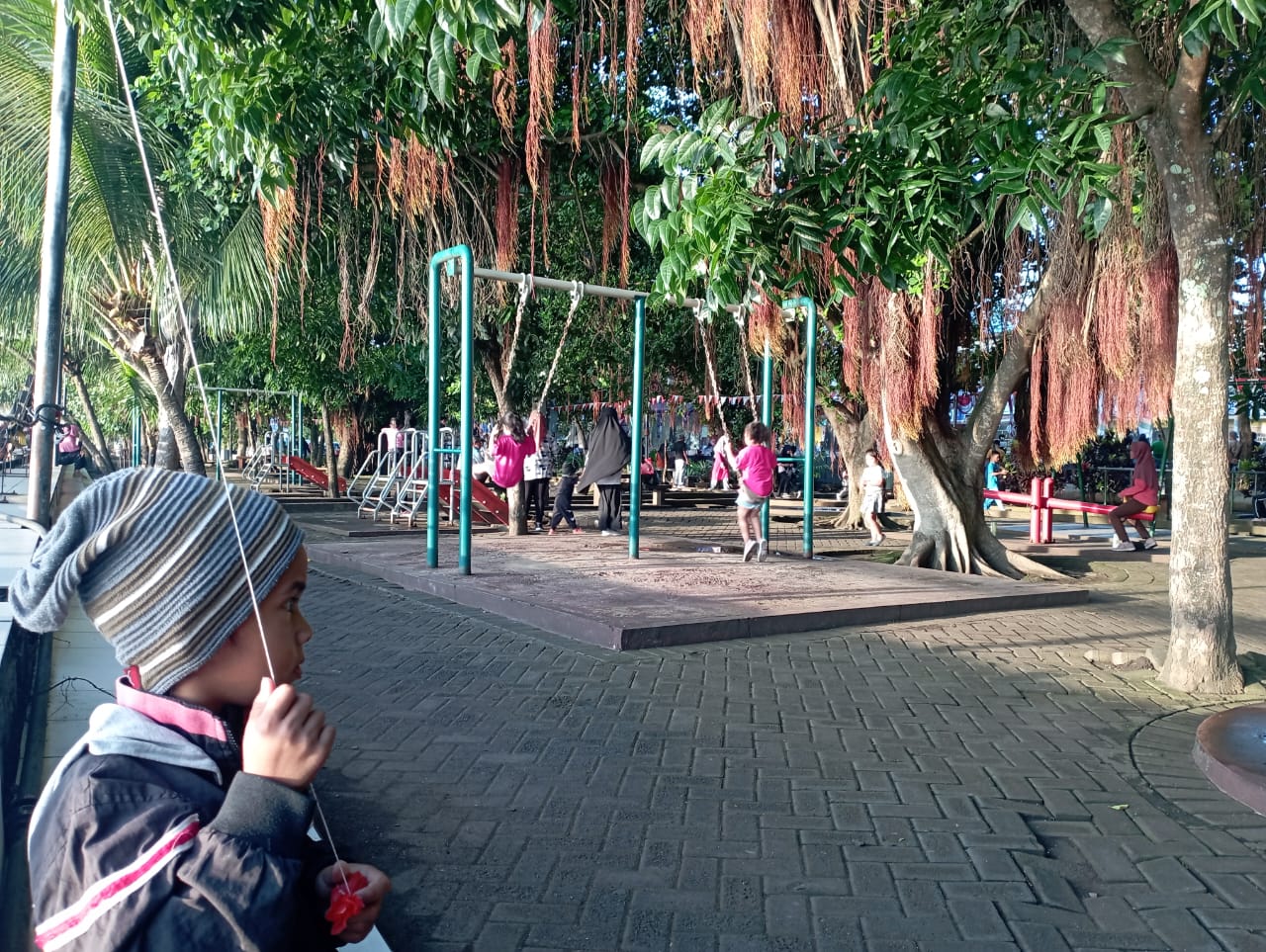
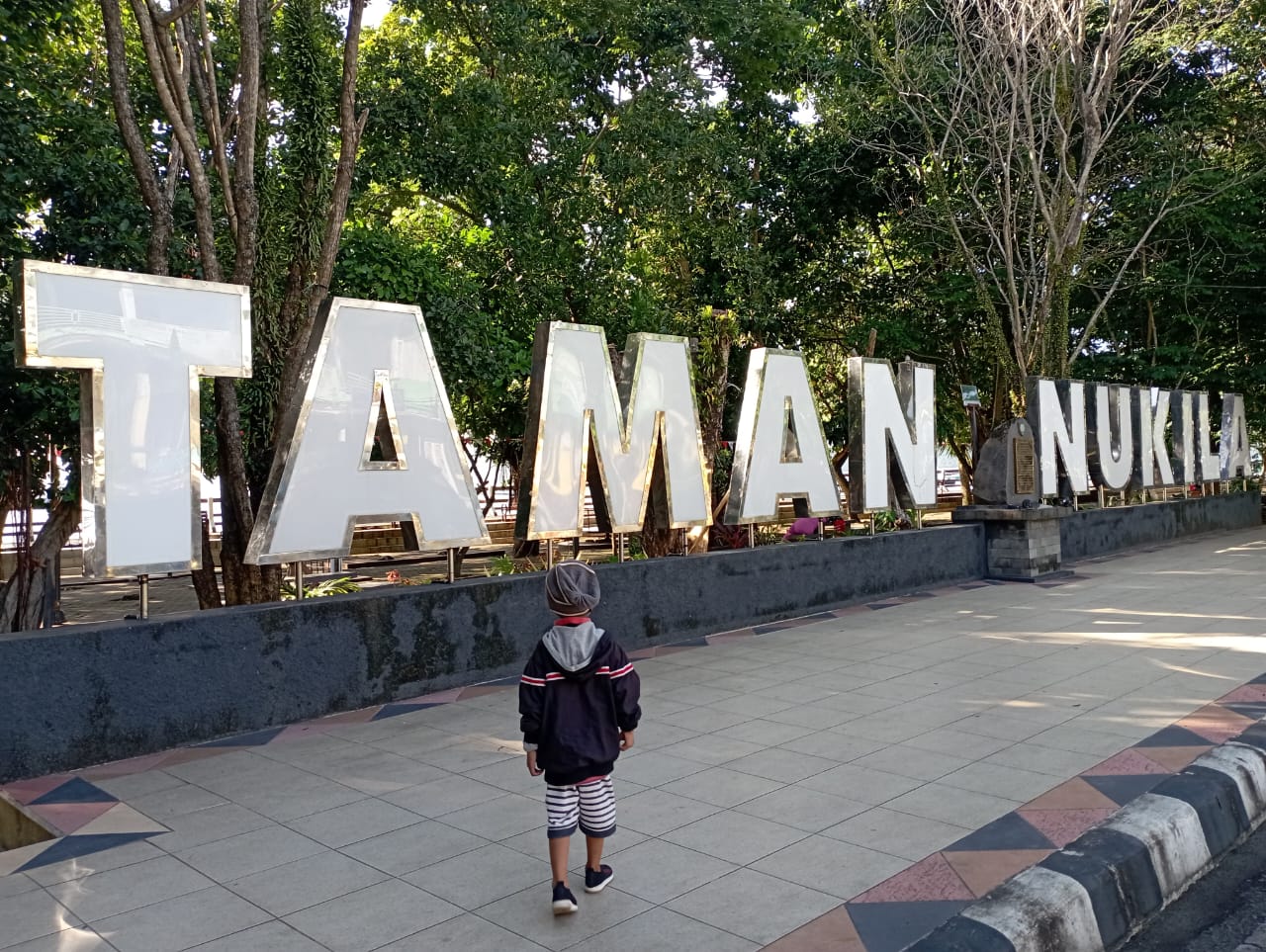
My heart started beating fast, not from the loud music of the buses, still audible, or from a sighting of a sweetheart, but from apprehension. I felt that the air, which had been warm, was now cold.
‘Ichan, you know… I’m actually afraid of the sea’. I tried to speak honestly. But Ichan didn’t respond, in fact he simply ran off to the boardwalk as soon as my motorbike’s kickstand went down to the ground. Straightaway he started searching for small stones and threw them into the sea. Without Ichan noticing, I started to feel shaky, and broke out in a cold sweat. I endeavored to steel myself for the sake of Ichan. Then I remembered what Ratna had said. Maybe this is the moment to face my trauma.
The children’s swing, which was right beside the boardwalk and its railing looking over the ocean, meant I was quite close to the source of my fear. From where I stood, I suppose it was very easy to stare at the sea, yet I did my best to turn my back on it, in an attempt to manage my nerves. For almost 30 minutes, it was like I was warring with my own feelings, the fear, and the effort to overcome it, until, just before we went home, I felt I had successfully beaten it.
Ichan finished up playing on the swing, and we left. Every footfall I took across Nukila Park signaled the start of a process of recovery for me.
*
One early morning soon afterwards, I walked two kilometers from my family home to return to Nukila Park.
The streets were still quiet, except for a few places that were filled with cake stalls. The vehicles that were passing still had their lights on. When I arrived, Nukila Park felt like it was preparing to welcome the morning sun that still seemed shy out there on the horizon. Then the sun’s golden color began to be reflected on the rippled surface of the sea. The air still felt cool on my skin. The smells of seawater and eggs being fried by the batagor hawker roving around the park merged together.
Several cleaners were sweeping the paths of the park, using brooms made from the leaves of coconut trees. They looked happy as they told stories to each other and laughed merrily. When I walked past towards the boardwalk they greeted me with smiles.
‘Going for a swim, little sister?’ asked a middle-aged woman as I approached the levee.
‘Yeah, auntie’, I said succinctly, not wanting to share all my inner turmoil of facing my biggest fear with her.
‘Yep, yep, you’re here in the morning, if people get here very early they usually want a swim or a morning run’.
The surrounding street-lights went out. Wet patches were on the boardwalk from crashing waves that had flooded across some time before. Slowly I made my way in the direction of the steps next to the Great Mosque that stood beside the park, then sat there a minute. Several people were already busy swimming. My feelings felt all mixed-up, which made me ask myself: am I really ready to swim? I’d been taking some swimming lessons of late, but with an instructor, so I hadn’t been too afraid. Although even so, there had been a few times where my head had gone under the water and I’d almost fainted, after which I had returned to this trauma which was mine – and returned to not wanting to swim. But now, without anyone around to watch over me, I willed myself to be brave.
I turned my head several times to the left and right, making sure the sea was tranquil. Further out I saw people swimming freestyle or breaststroke, making it look so easy as they shot along on the water’s surface.
‘Hey, what are you daydreaming for?’ Another woman, perhaps in her early forties, greeted me. She introduced herself as Ci Ati. ‘These sorts of mornings are good for exercise, not day-dreaming. Let’s go swim.’
Instantly, I smiled. My anxiety, which had initially blanketed all my thoughts, began to abate.
‘Auntie, if I start to drown, will you help?’
‘Of course, no problem. I’ll watch over you and give you some pointers as you swim’.
I went down to the sea and performed an exercise several times, breathing in through my mouth, then ducking my head under the surface, then breathing out through my nose whilst under the water. It’s an exercise done to steady the heart, as a way to not get out of breath when swimming. After doing this ten times, I started to swim slowly. Ci Ati was swimming next to me, freestyle, while I was breast-stroking. Between some seagrass and some decent-sized coral, I focused on calming my thoughts and just swimming. Several fish, multi-colored, I could see entering and exiting gaps in the coral.
Swimming is an exercise where you resist the pressure of water, a pressure that feels heavy, so it spurs your heart to beat faster. From time to time, when I was in shallow water, I stood up, and enjoyed the sun that was now turning bright yellow, and felt the sand mixed with stones massaging the soles of my feet. A wind added to the waves on the sea’s surface and barreled into me. The water wasn’t too cold this morning. Feelings appeared in tandem: amazement that I could manage my fear of the sea, and simultaneously, continued fear.
After an hour, I felt I’d had enough, said goodbye to Ci Ati, and got out. The ends of my fingers were wrinkled. I went home, with the intention of returning again to Nukila Park in the late afternoon.
When I did so, things were pretty busy, different to the morning when the park had felt like the property purely of people who were exercising. Especially if there’s no rain in the afternoon, lots of little kids accompanied by their parents come to play in the playground equipment here. I chose to sit on one of the long benches facing the sea, arriving at one just as a group stood up and left it unoccupied. Soon, a kid ran quickly in front of me toward the boardwalk and railing, with a woman following after him. She asked permission to sit next to me so she could easily keep an eye on her child.
From our brief discussion, I came to know that she was a migrant. The thing that made her most enjoy living in Ternate was being near the sea. Indeed, I thought to myself: the places we’re frightened of can be the places most-loved by others. I told her the story of my trauma with the sea and how I was learning to get over it in Nukila Park.
‘I guess our reasons for coming here are different, Mbak’, said Weni.
‘Yeah, I guess most people come here to enjoy the atmosphere…’
Our discussion was cut off when her child, about four years old, yelled: ‘Mummy, there’s lots of fish!’
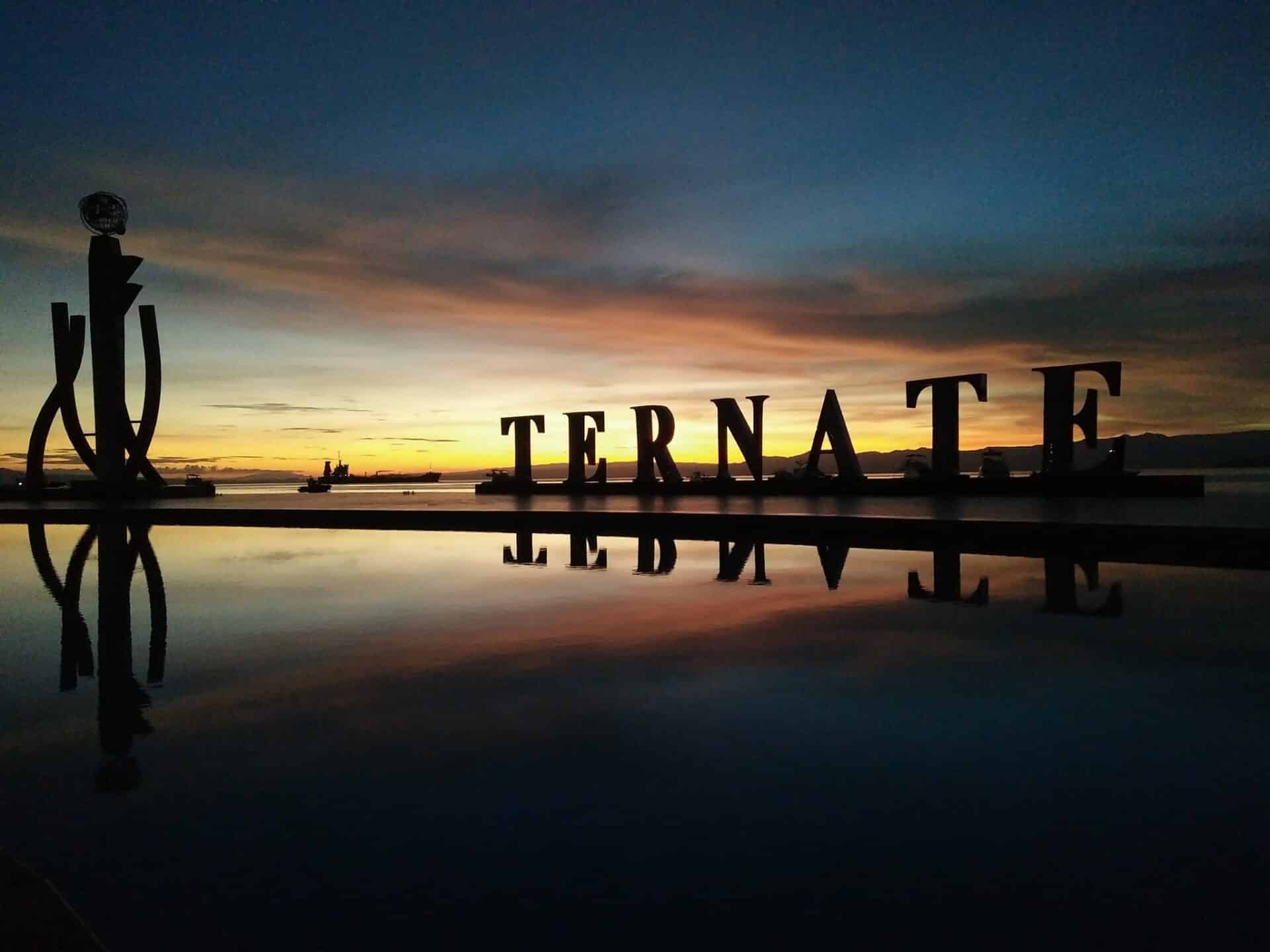
Weni approached her son as if she was joining in the celebration of an achievement, being able to see the fish together. Meanwhile, several people came along offering menus from the café that serves Nukila Park. If you want to order something, you just tell them and they’ll bring it to wherever you’re sitting, as long as you’re somewhere inside the park itself.
After Weni and her child said goodbye and went home, I spent some quality time with an order of fried breadfruit, peanuts, and a coffee from the café. I witnessed meetings of people, chatting interspersed with laughter, and children who were screaming, crying, or chasing and being chased. The large trees that were growing sheltered us like umbrellas, and a sea breeze ruffled clothes and headscarves. The passing-by of boats became its own entertainment for me, as their engines mixed with the sound of vehicles and loud music coming from the road in front of the park.
I sat silently for about an hour, until the smell of the sea brought by the evening winds started to make me shiver. The street-lights turned on. Not long after, the sound of the Maghrib adhan echoed out from the mosque next to Nukila Park. Myself and quite a few others began to head home, though some people remained seated, and indeed, a few people were only just arriving.
I hadn’t suspected that by coming to the seashore and swimming, a place that had previously been frightening for me had changed and become pleasurable. Nukila Park is my place of celebration and recuperation after my trauma with the sea.
© Amy Djafar
English translation © Lise Isles
Commissioning editor: Wahyu Nur Cahyo
